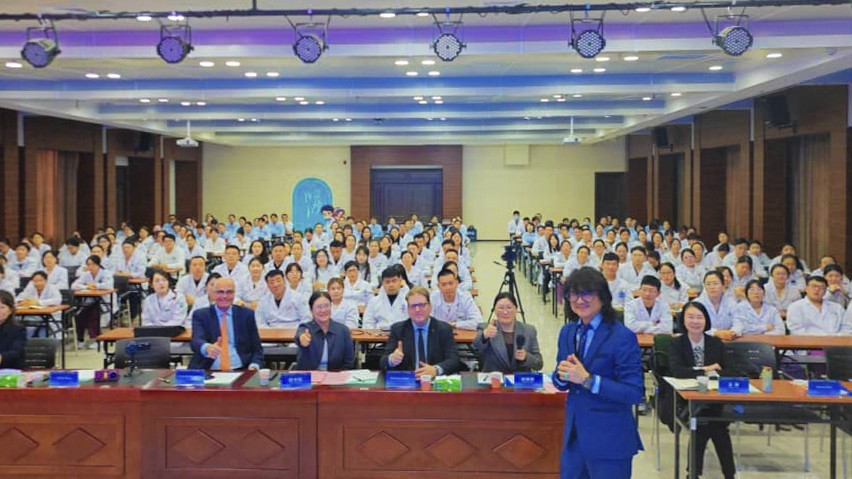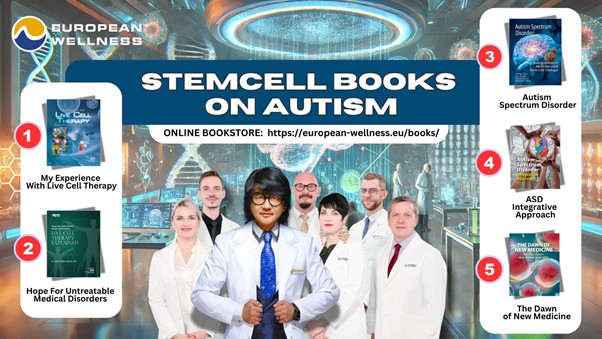A Pioneering Vision for Autism Treatment
Autism Spectrum Disorder (ASD) is a neurodevelopmental disorder that causes lifelong impairment in behaviour, communication, and socialisation. ASD has long posed complex challenges for families, medical professionals, and policymakers worldwide. The growing prevalence of ASD, combined with the limitations of conventional treatments, has driven the search for innovative and effective therapies.
Among the leading voices in this transformative field is Prof. Mike Chan, a pioneer in bioregenerative medicine and Chairman of the European Wellness Biomedical Group (EWBG). With decades of experience in cellular therapy, organotherapy, and precursor stem cell research, Prof. Mike Chan’s groundbreaking work in targeted brain-specific and organ-specific precursor stem cell therapy is offering renewed hope to families navigating the intricacies of autism treatment.
“The untreatable is treatable,” said Prof. Mike Chan. Every child, regardless of background, deserves a chance to reach their full potential. With the right support, we can bridge the gap between science and accessibility, ensuring that life-changing treatments are available to all.”
April: Autism Awareness Month
April is Autism Awareness Month, starting with World Autism Awareness Day on April 2nd, a UN-sanctioned day to raise awareness and promote acceptance of autism. This month highlights the importance of early diagnosis, accessible treatments, and inclusion. Researchers and advocacy groups use this time to showcase the latest advancements in autism therapies, making it an ideal moment to highlight Prof. Mike Chan’s pioneering work in regenerative medicine.
According to recent statistics in 2023, approximately 1% or 75 million of the global population are living with ASD. In the United States, the Centers for Disease Control & Prevention (CDC) estimates the prevalence of ASD to be 1 in 36 children. Furthermore, between 2011 and 2022, autism diagnoses in the U.S. surged by 175% (from 2.3/1000 persons to 6.3/1000 persons). These figures highlight the significant and increasing global impact of autism. Notably, Qatar and the UAE have the highest rates of autism in the world.
A Personal Mission Rooted in Experience
Prof. Mike Chan’s commitment to autism treatment is deeply personal— he himself was born autistic. Having overcome significant challenges in his early years, his firsthand understanding of autism fuels his dedication to pioneering therapies that can improve the lives of children and adults with ASD. His mission extends beyond research; he envisions a world where every autistic child has access to cutting-edge medical interventions and the opportunity to thrive.
“Autistic children are the future of the world and shouldn’t be a stigma to society. Knowledge is key for parents and the best doctors for autistic children are their parents,” said Prof. Mike Chan, underscoring the crucial role of family in supporting children with ASD.

Global Expansion: The Baoding Initiative
Prof. Mike Chan’s work has gained global traction, particularly in Baoding, China, where he has spearheaded multiple international collaborations to advance autism research and treatment. During his second visit to Baoding on March 10-11, 2025, returning after his landmark visit in July 2024, Prof. Mike Chan, representing Germany as a Senator of BWA, Germany (Federal Association for Economic Development & Foreign Trade), laid the groundwork for a series of transformative initiatives:
- Establishment of the International Stem Cell Therapy Joint Laboratory – A groundbreaking research hub dedicated to autism treatment and regenerative medicine.
- Collaboration with Baoding Children’s Hospital – Partnering with leading pediatric specialists to integrate precision stem cell therapy for children with ASD.
- High-Level Meetings with Chinese Officials – Engaging policymakers to ensure government support and funding for autism research, including Dang Xiaolong (Secretary of Baoding Municipal Party Committee) and Ma Yimin (Mayor of Baoding).
- Strategic Partnerships with German and Chinese Medical Institutions – Bridging Eastern and Western medical expertise to drive innovation in bioregenerative therapies.
- Education & Precursor Stem Cell Research – Mike Chan plans to bring education and precursor stem cell research to Baoding, fostering local expertise and continued innovation in autism treatment.
During his visit, Prof. Mike Chan delivered an impactful lecture at Baoding Children’s Hospital, where he presented the latest advancements in bioregenerative medicine, including precursor stem cell therapy for autism. A photo (above) from this event shows Prof. Mike Chan giving a lecture to hundreds of medical professionals in a Baoding lecture hall. His lecture attracted a distinguished audience of medical professionals, researchers, and policymakers, sparking discussions on how regenerative medicine could revolutionize paediatric healthcare in China and beyond.
The Science Behind the Breakthrough
At the core of Prof. Mike Chan’s autism treatment methodology is a targeted organ and brain-specific bioregenerative precursor stem cell therapy. Unlike conventional treatments that merely manage symptoms, his approach seeks to restore cellular function and improve neurodevelopmental outcomes. This aligns with the principles of precision medicine, a medical model that proposes the customization of healthcare, with treatments being tailored to individual patients rather than a one-size-fits-all approach. Precision medicine focuses on “an ‘A’ for ‘A’ disease, rather than an A for A-to-Z diseases (all different disorders)”. Key components of his methodology include:
- ✅ Neuroregeneration & Repair – Using brain-specific precursor stem cells to replace damaged neurons, improving communication and cognitive function. The recommended targeted precursor brain stem cells for autistic children focus on specific brain regions including the frontal lobe, temporal lobe, thalamus, basal ganglia, hypothalamus, cerebral cortex, amygdala, hippocampus, and cerebellum.
- ✅ Anti-Inflammatory Effects – Reducing neuroinflammation, which is commonly associated with autism. Stem cell therapy in ASD is believed to achieve this through immune modulation and neuroprotective effects, as well as the inhibition of microglial activation and reduction of pro-inflammatory cytokine production.
- ✅ Oxidative Stress Reduction – Utilizing stem cells and antioxidant therapy to mitigate oxidative damage in the brain.
- ✅ Synaptic Plasticity Enhancement – Promoting neuronal growth and connectivity to enhance learning and behavioral responses. Stem cell therapy may contribute to this by facilitating the re-establishment of neural connectivity through new synapse formation.
- ✅ Gut Health & Autism Link – Addressing gut-brain axis dysfunction by improving gut microbiota, a crucial factor in many ASD cases.
- ✅ Heavy Metal Detoxification – Using bioregenerative therapies to eliminate toxic heavy metals that may disrupt neurodevelopment.
“The main thing to do for autism is to prepare and treat the brain, the rest is secondary,” notes Prof. Mike Chan, underlining the primary importance of neurological treatment in his approach.
This precision medicine approach enables individualized treatment plans based on the patient’s specific neurological deficits, moving autism therapy toward personalized, data-driven solutions. The mechanism of action for precursor stem cell therapy involves homing, paracrine signaling, and regeneration & reactivation of host cells, leading to sequential reactions such as absorption-transportation incorporation and visible functional improvement.
Stem cell therapy (SCT) is a minimally invasive procedure where live stem cells from human or animal origin are implanted due to their multi-potency and restorative function, and it may be considered when conventional treatments are no longer effective. These Precursor Stem Cells (PSC) (Targeted Organ & Brain-Specific) are unipotent and differentiate into only one specific cell type, and the procedure typically involves a no-surgery, deep intramuscular injection (IM).

New Research & Publications
As part of his ongoing commitment to autism research, Prof. Mike Chan has published multiple medical books and scientific papers, offering insights into the latest developments in bioregenerative medicine, amongst them:
- 📖 “Hope For Untreatable Medical Disorders With Live Cell Therapy Explained” – Authored by Dr. Abdul Halim Abdul Jalil, this medical research publication explores innovative live cell therapy approaches for addressing previously untreatable medical conditions.
- 📖 “My Experience With LIVE CELL THERAPY” – This publication discusses the author’s personal journey with live cell therapy, detailing the preparation and requirements for optimal treatment outcomes. It emphasizes the importance of a healthy lifestyle, including proper nutrition, exercise, and detoxification, to enhance the effectiveness of live cell therapy – which represents an important advancement in medical treatment.
- 📖 “Autism Spectrum Disorder: Bioregenerative Medicine With Stem Cell Therapy.“ – This book delves into bioregenerative therapies such as antioxidant therapy, hyperbaric oxygen therapy, and mitochondrial organelles replacement therapy as potential treatments for ASD.
- 📖 “Autism Spectrum Disorder: Integrative Approach” – Co-authored with Dr. Dina Tulina, this book explores autism as a mitochondrial disease, detailing bioregenerative therapies that target root causes rather than symptoms.
- “The Dawn of New Medicine – Stem Cell Therapy: Old Dogma, New Hope” – This book explores stem cell therapy as a form of regenerative medicine that promotes the regrowth, repair, or replacement of diseased, dysfunctional, or damaged tissues. This publication aims to inspire hope in managing conditions such as Down Syndrome, Autism Spectrum Disorder, Cerebral Palsy, and global developmental delay.
- 📖 “Stem Cells & Regenerative Medicine: High-Efficacy Treatment Protocols for Autism Spectrum Disorders” – Co-authored with Prof. Dr. Dmytro Klokol and Prof. Dr. Michelle Wong, this publication outlines novel targeted therapeutic approaches for autism.
- 📖 “Pathogenetically Based Integrative Therapeutic Strategies in Management of Autism Spectrum Disorders” – A research paper that delves into the biological mechanisms underlying ASD – including immune system failure, changes in the cerebellum, oxidative stress, and altered neural connectivity; and offering an integrative treatment approach combining regenerative medicine and traditional therapies.
Upcoming Autism Health Summit in San Diego
Looking ahead, Prof. Mike Chan will be participating in the Autism Health Summit in San Diego on April 11-13, 2025, where he will present the latest advancements in bioregenerative medicine for autism. This global event brings together leading experts, researchers, and medical professionals to discuss cutting-edge treatments and future directions in autism therapy. Prof. Mike Chan’s session will highlight real-world case studies, groundbreaking research, and the evolving role of stem cell therapy in transforming ASD care with case studies of children treated with Stem Cell Therapy (SCT).
A Vision for the Future
Prof. Mike Chan’s lifelong dedication to autism treatment is transforming the landscape of bioregenerative medicine. His pioneering stem cell therapy protocols, international collaborations, and humanitarian initiatives are driving a global shift in how autism is understood and treated.
“Progress is key,” says Prof. Mike Chan. With the right approach, we can help children with autism reach their fullest potential. The future of autism therapy lies in precision medicine, targeted neurological interventions, and global collaboration. Our mission is to ensure that no child is left behind.”
With Baoding emerging as a hub for autism research, the launch of a world-class stem cell therapy laboratory, the future of autism treatment is brighter than ever.


Comments are closed.